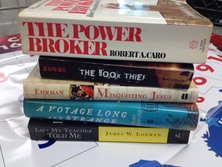 Mr. Richardson here. I got a lot of reading done this summer, and look forward to incorporating these books into our classroom. Some of the books: I reread Loewen's Lies My Teacher Told Me, which is one of the really great books that shows just how political and flawed all of our textbooks are. The anecdotes about Woodrow Wilson and Helen Keller are some of my favorite, and I especially enjoyed sharing this with a new teacher who had never heard of it. Some part to do seem a little dated, as this book has been out so long that it has changed a lot of educators practice, but I was glad for the philosophical and practical elements. A great APUSH student from last year, Ms. Shvueli, told me I should read Zusak's The Book Thief, and loaned me her copy for the summer. This is a great lesson: if you want somebody to do something, give them the tools to make that happen :) I really enjoyed this book; it has a nice mix of beautiful imagery, humor, and pathos. I don't think it's as good as Slaughterhouse Five, but it definitely reminded me of Vonnegut's masterpiece. A friend from church gave me Ehrman's Misquoting Jesus a decade ago, and even though I had him as a professor at UNC I never actually read this book until the summer. This was a good lay introduction to the textual analysis of the Christian bible and it definitely made me think of the analysis skills we use in APUSH. The ultimate question posed, about whether any definitive interpretation is possible also seems related to the crisis of interpretation many students have in my class. Once we start to see the perspective of the author found in any document, it can be easy to fall into a trap of thinking there is no ultimate objective reality. History can still be a guide to human behavior and what made America what it is today. As Ehrman argues, our interpretation of the past can tell us as much about ourselves as it does the past. A Voyage Long and Strange is the APUSH summer reading this year, so I read along and made my own guide for the questions we asked. It ended up being about 16 pages, and I certainly hope no student turns in anything that long :) Ron Chernow's Titan is very similar to his Alexander Hamilton: it takes someone you recall from (usually slanted) history class and expands them into a full person. I learned a TON about Rockefeller from this book and really enjoyed it, but I was surprised to by the time he "retired" from Standard Oil we still had 400 pages left. I especially enjoyed the juxtaposition of the conservative life he lead with his impish turn near the end, flirting with and pinching the cute girls he got to go on long car rides with him. A huge theme in this book was his alienation from family, his children, and especially his wife. Reading about her slowly wasting away and his thoughtful letters and gifts but ongoing refusal to stop rotating through different estates was heartbreaking. That leads me from the 830 page book about power and Getting Things Done to the 1150 page book about the same, Robert Caro's Power Broker. I LOVED this book. It is crazy, and every page is filled with interesting stories about Robert Moses, who for 50 years controlled construction of parks, highways, and housing in New York. I still have about 150 pages left, but this book has transformed the way I view public works. I reread two 100-year old books of advice called "letters from a Self-Made Merchant to his Son" which are sweet and funny (and sexist and racist) I read Ryan Holiday's new book "Ego is the Enemy," which was ok but not as good as his excellent "Obstacle is the Way." There were others, but these were my top reads this summer! I hope you all had a lovely summer as well and I look forward to seeing you soon. Best, Colin Richardson, MAT
0 Comments
Leave a Reply. |
Daily BlogOn this blog we will share each day's activities and post reminders about assignments and upcoming assessments. Archives
January 2017
Categories |
 RSS Feed
RSS Feed